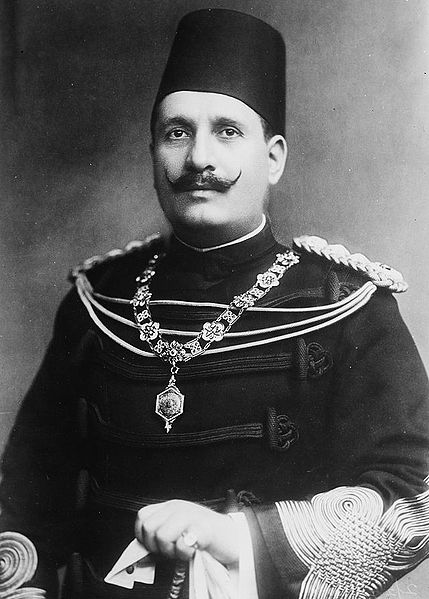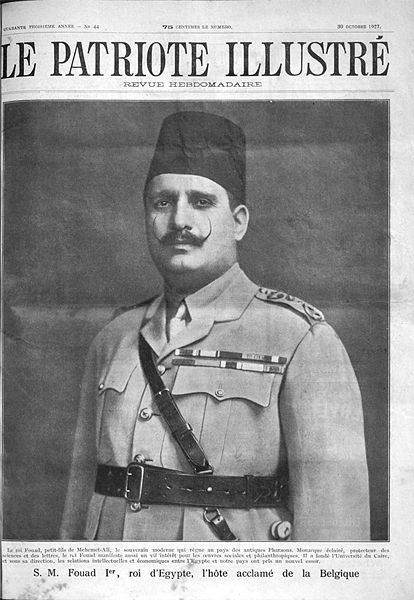<Back to Index>
- Naturalist Konrad Gessner, 1516
- Writer Louise Otto Peters (Otto Stern), 1819
- King of Egypt Fuad I, 1868
PAGE SPONSOR



Fuad I (26 March 1868 – 28 April 1936) was the Sultan and later King of Egypt and Sudan, Sovereign of Nubia, Kordofan, and Darfur. The ninth ruler of Egypt and Sudan from the Muhammad Ali Dynasty, he became Sultan of Egypt and Sudan in 1917, succeeding his elder brother Sultan Hussein Kamel. He substituted the title of King for Sultan when the United Kingdom unilaterally granted Egypt nominal independence in 1922.
Prior to becoming sultan, Fuad had played a major role in the establishment of Cairo University. He became the university's first rector in 1908, and remained in the post until his resignation in 1913. He was succeeded as rector by then minister of Justice Hussein Rushdi Pasha. In 1913, Fuad made unsuccessful attempts to secure for himself the throne of Albania, which had obtained its independence from the Ottoman Empire a year earlier. Fuad also served as President of the Egyptian Geographic Society from 1915 until 1918.
Fuad ascended the throne of the Sultanate of Egypt upon the death of his brother Hussein Kamel in
1917. On 28 February 1922, the United Kingdom ended its protectorate
over Egypt and granted it nominal independence, in the aftermath of the Egyptian revolution of 1919. As a result, Fuad issued a decree on 15 March 1922 whereby he changed his title from Sultan of Egypt to King of Egypt. In 1930, he attempted to strengthen the power of the Crown by abrogating the 1923 Constitution and
replacing it with a new constitution that limited the role of
parliament to advisory status only. Large scale public dissatisfaction
compelled him to restore the earlier constitution in 1935. The 1923
Constitution granted Fuad vast powers. He made frequent use of his
right to dissolve Parliament.
During his reign, cabinets were dismissed at royal will, and
parliaments never lasted for their full four-year term but were
dissolved by decree. Fuad was born in Giza Palace in Cairo, the seventh son of Isma'il Pasha. His mother was Farial Kadin. As a great-grandson of Muhammad Ali Pasha, Fuad was of Albanian descent. He married his first wife in Cairo, 30 May 1895 at the Abbasiya Palace in Cairo, 14 February 1896, H.H. Princess Shivakiar Khanum Effendi (1876 – 1947).
She was his cousin and the only daughter of Field Marshal H.H. Prince
Ibrahim Fahmi Ahmad Pasha. They had two children, a son, Ismail Fuad,
who died in infancy, and a daughter, Fawkia. Unhappily married, the
couple divorced in 1898. During a dispute with the brother of his first
wife, Fuad was shot in the throat. He survived, but carried that scar
for the rest of his life. Fuad married his second wife at the Bustan Palace, Cairo, 26 May 1919. She was Nazli Sabri (1894 – 1978), daughter of H.E. Abdu'r-Rahim Pasha Sabri, sometime Minister of Agriculture and Governor of Cairo, by his wife, Tawfika Khanum Sharif. Queen Nazli also was a maternal granddaughter of Major General H.E. Muhammad Sharif Pasha, sometime Prime Minister and Minister for Foreign Affairs, and a great-granddaughter of Suleiman Pasha, a French officer in Napoleon's army who converted to Islam and reorganized the Egyptian army. The couple had five children, the future Farouk I and four daughters, the Princesses Fawzia (who became Queen Consort of Iran), Faiza, Faika, and Fathiya.
As with his first wife, Fuad's relation with his second wife was also
stormy. The couple continually fought; Fuad even forbidding Nazli from
leaving the palace. When Fuad died, it was said that the triumphant
Nazli sold all of his clothes to a local used clothes market in
revenge. Fuad died at the Qubba Palace in Cairo and was buried at the Khedival Mausoleum in the ar-Rifai Mosque in Cairo.
The Fuad Muslim Library in China was named after him by the Chinese Muslim Ma Songting.